FINE ART FOR INTERIOR DESIGN
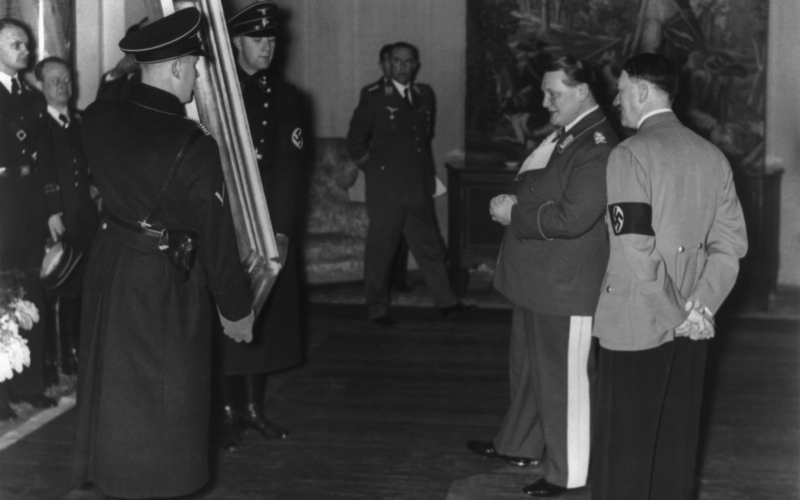
It wasn't long after the May 1940 Nazi conquest of the Netherlands that Hitler and Field Marshal Hermann Goering embarked on an avaricious rivalry centered on classic works of art. Both grew fascinated by the treasure trove of European art that would be Germany's for the taking with every country overrun by its military machine. Of particular interest to both men were the priceless works of art from the Dutch Golden Age. It was Hitler's dream of creating a spectacular art museum in Linz, Austria, where he would place works by Peter Paul Rubens, Vermeer, Rembrandt, and others. Not to be outdone, Goering vied to confiscate prized art for his own private collection. Characteristically exacting German precision was employed in appraising every one of these works. Each objet d'art would be earmarked either for Hitler's planned museum, high-ranking German officials' collections, or for sale to finance the seemingly inexorable expansion of the Nazi regime.
It wasn't long after the May 1940 Nazi conquest of the Netherlands that Hitler and Field Marshal Hermann Goering embarked on an avaricious rivalry centered on classic works of art. Both grew... Read More
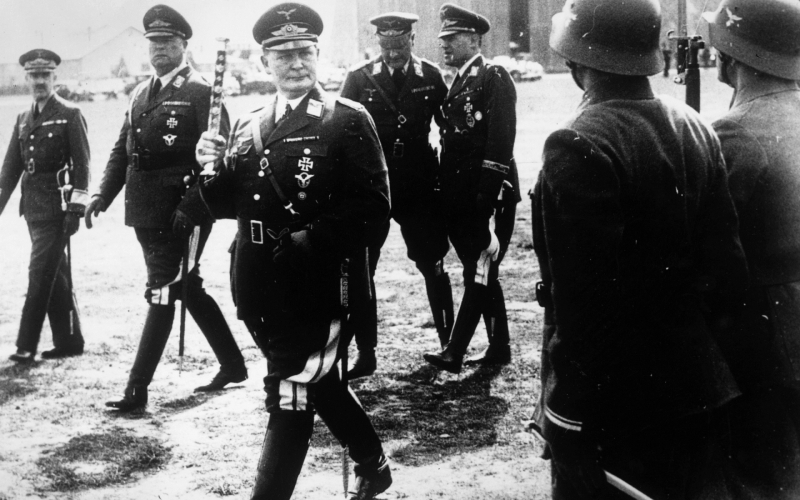
The 1940 establishment of the Paris-based Western branch of the Reichsleiter Rosenberg Institute for the Occupied Territories (Einsatzstab Reichsleiter Rosenberg fur die Besetzten Gebiete), commonly known as ERR, proved to be the opening salvo in a systematic offensive intended to plunder Jewish collections of art and other objects. Nominally operated under the leadership of Gerhard Utikal, ERR was established to gather Jewish and Freemasonic printed material from France, Belgium, and the Netherlands and transport it to Germany for additional study or eradication. But ERR actually operated under the iron-fisted control of Herman Goering, seen here in full military regalia. Under Goering’s command, ERR’s mission soon transitioned into the seizure of art collections owned by Jews. Collected at the Paris Museum Jeu de Paume, ERR’s receiving center, the priceless works were inventoried by art historians before being transported to Germany for their ultimate consignments or destruction.
The 1940 establishment of the Paris-based Western branch of the Reichsleiter Rosenberg Institute for the Occupied Territories (Einsatzstab Reichsleiter Rosenberg fur die Besetzten Gebiete), commonly... Read More
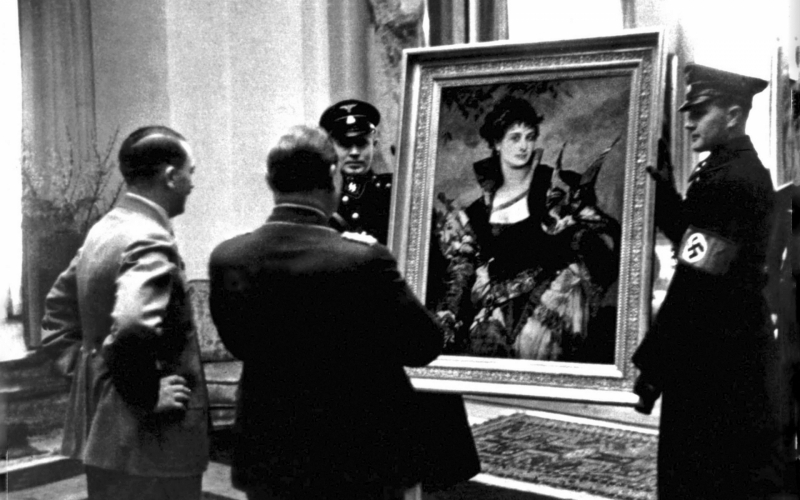
As the Nazi occupation of Western Europe expanded in the early years of the Second World War, almost 22,000 pieces of art were ultimately pillaged from German-occupied lands. Goering traveled to Paris nearly two dozen times from late 1940 to late 1942, making the Museum Jeu de Paume his destination. There he witnessed art expositions mounted solely for his own edification. Though Hitler had decreed all confiscated art would be his, Goering selected more than 590 pieces of prized art exhibited at the Jeu de Paume, snatching it for his own private ownership. Not surprisingly, as Hitler and Goering commandeered greater and greater troves of Europe’s greatest art collections, simple supply-and-demand forces sparked a precipitous surge in world art prices. Like avaricious gluttons emboldened by their superiors’ piggishness, lesser-known German military officers and officials, as well as German museums, soon swept into rapaciously appropriate art treasures for themselves.
As the Nazi occupation of Western Europe expanded in the early years of the Second World War, almost 22,000 pieces of art were ultimately pillaged from German-occupied lands. Goering traveled to... Read More
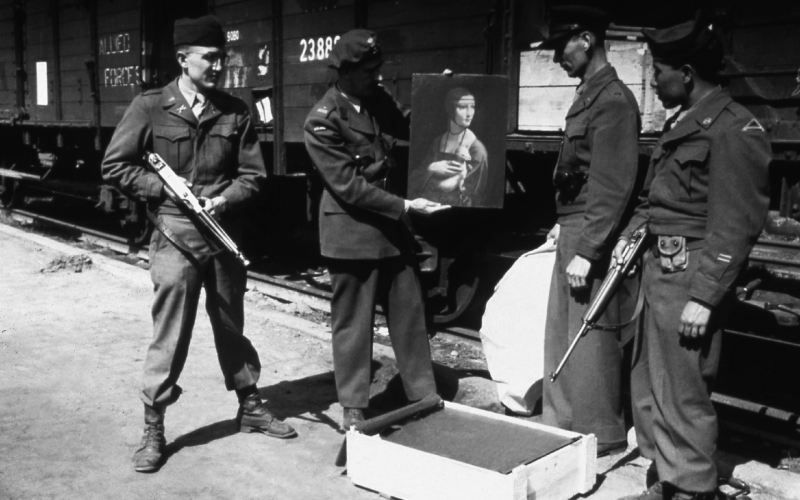
Consider for a moment the exquisite world of art, proclaimed in terms of beauty, elegance, and grace. Now consider Nazism among the crudest, harshest, most unforgiving regimes to scar the annals of human history. These two worlds, one magnificent, the other menacing, came together in Hitler's and Goering's' quest for fine art. There was nothing scholarly about Goering's greedy rape of European collections. The martinet simply took whatever he could with little insight into its value. Across 20 visits to occupied Paris, Goering absconded with 1,700 paintings, a number more significant than the European holdings of the National Gallery of Art. But as American and Russian forces descended upon Germany late in the war, not even Goering could delude himself any longer. His only choice was to surrender to the Americans, as he knew the Russians would waste little time attending to his immediate execution.
Consider for a moment the exquisite world of art, proclaimed in terms of beauty, elegance, and grace. Now consider Nazism among the crudest, harshest, most unforgiving regimes to scar the annals of... Read More
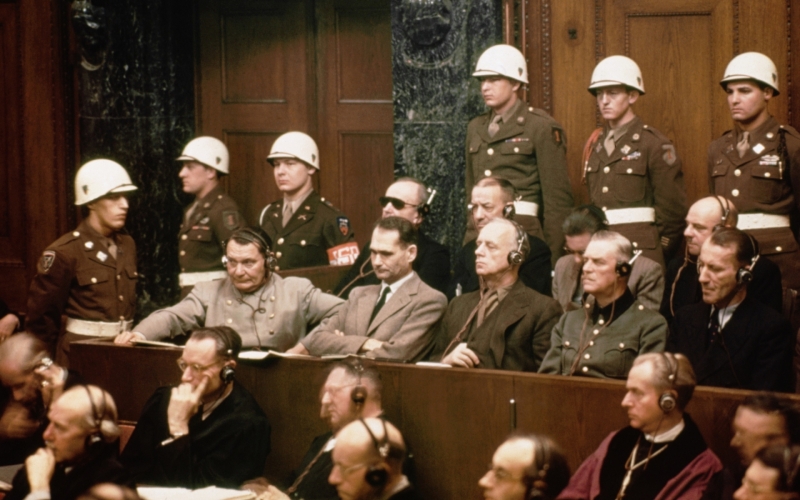
With his bride Eva Braun and dog Blondi at his side in a Berlin bunker, Hitler would take his own life on April 30, 1945. It was his only means of averting capture by the Russian Red Army. Hermann Goering was captured by the Americans rather than the Russians, fueling his hopes for extra weeks or months of life. He was the second-highest German officer tried in the Nuremberg Trials that began months later. Indictments against him included four charges, one of which was that he had taken part in the plunder and transport to Germany of property that included works of art. Found guilty of all four charges, Goering was sentenced to death by hanging but instead took his own life in October 1946 by ingesting cyanide smuggled into his cell. Efforts to return to its rightful owners the great art he plundered continues to this day.
With his bride Eva Braun and dog Blondi at his side in a Berlin bunker, Hitler would take his own life on April 30, 1945. It was his only means of averting capture by the Russian Red Army. Hermann... Read More
Watch Video: Hermann Goering and the Cultural Rape of Europe
Watch Video: Hermann Goering and the Cultural Rape of Europe
.jpg)
.jpg)
.jpg)
.jpg)
.jpg)
This superb establishment is an excellent example of a cliff dwelling on the magnificent Isle of...
A short distance away from Chicago's famed Magnificent Mile, the Driehaus Museum offers visitors a...
On the run. Moving from town to town. Hiding in obscure, roadside inns and on top of the Kings...
In 2014 the Starbucks Coffee Company opened its first Reserve® Roastery in the Capitol Hill...
Hermann Goering and the Cultural Rape of EuropeBy: Jeffrey Steele |

|
|
It wasn\'t long after the May 1940 Nazi conquest of the Netherlands that Hitler and Field Marshal Hermann Goering embarked on an avaricious rivalry centered on classic works of art. Both grew fascinated by the treasure trove of European art that would be Germany\'s for the taking with every country overrun by its military machine. Of particular interest to both men were the priceless works of art from the Dutch Golden Age. It was Hitler\'s dream of creating a spectacular art museum in Linz, Austria, where he would place works by Peter Paul Rubens, Vermeer, Rembrandt, and others. Not to be outdone, Goering vied to confiscate prized art for his own private collection. Characteristically exacting German precision was employed in appraising every one of these works. Each objet d\'art would be earmarked either for Hitler\'s planned museum, high-ranking German officials\' collections, or for sale to finance the seemingly inexorable expansion of the Nazi regime. |

|
|
The 1940 establishment of the Paris-based Western branch of the Reichsleiter Rosenberg Institute for the Occupied Territories (Einsatzstab Reichsleiter Rosenberg fur die Besetzten Gebiete), commonly known as ERR, proved to be the opening salvo in a systematic offensive intended to plunder Jewish collections of art and other objects. Nominally operated under the leadership of Gerhard Utikal, ERR was established to gather Jewish and Freemasonic printed material from France, Belgium, and the Netherlands and transport it to Germany for additional study or eradication. But ERR actually operated under the iron-fisted control of Herman Goering, seen here in full military regalia. Under Goering’s command, ERR’s mission soon transitioned into the seizure of art collections owned by Jews. Collected at the Paris Museum Jeu de Paume, ERR’s receiving center, the priceless works were inventoried by art historians before being transported to Germany for their ultimate consignments or destruction. |

|
|
As the Nazi occupation of Western Europe expanded in the early years of the Second World War, almost 22,000 pieces of art were ultimately pillaged from German-occupied lands. Goering traveled to Paris nearly two dozen times from late 1940 to late 1942, making the Museum Jeu de Paume his destination. There he witnessed art expositions mounted solely for his own edification. Though Hitler had decreed all confiscated art would be his, Goering selected more than 590 pieces of prized art exhibited at the Jeu de Paume, snatching it for his own private ownership. Not surprisingly, as Hitler and Goering commandeered greater and greater troves of Europe’s greatest art collections, simple supply-and-demand forces sparked a precipitous surge in world art prices. Like avaricious gluttons emboldened by their superiors’ piggishness, lesser-known German military officers and officials, as well as German museums, soon swept into rapaciously appropriate art treasures for themselves. |

|
|
Consider for a moment the exquisite world of art, proclaimed in terms of beauty, elegance, and grace. Now consider Nazism among the crudest, harshest, most unforgiving regimes to scar the annals of human history. These two worlds, one magnificent, the other menacing, came together in Hitler\'s and Goering\'s\' quest for fine art. There was nothing scholarly about Goering\'s greedy rape of European collections. The martinet simply took whatever he could with little insight into its value. Across 20 visits to occupied Paris, Goering absconded with 1,700 paintings, a number more significant than the European holdings of the National Gallery of Art. But as American and Russian forces descended upon Germany late in the war, not even Goering could delude himself any longer. His only choice was to surrender to the Americans, as he knew the Russians would waste little time attending to his immediate execution. |

|
|
With his bride Eva Braun and dog Blondi at his side in a Berlin bunker, Hitler would take his own life on April 30, 1945. It was his only means of averting capture by the Russian Red Army. Hermann Goering was captured by the Americans rather than the Russians, fueling his hopes for extra weeks or months of life. He was the second-highest German officer tried in the Nuremberg Trials that began months later. Indictments against him included four charges, one of which was that he had taken part in the plunder and transport to Germany of property that included works of art. Found guilty of all four charges, Goering was sentenced to death by hanging but instead took his own life in October 1946 by ingesting cyanide smuggled into his cell. Efforts to return to its rightful owners the great art he plundered continues to this day. |

|
|
Watch Video: Hermann Goering and the Cultural Rape of Europe |